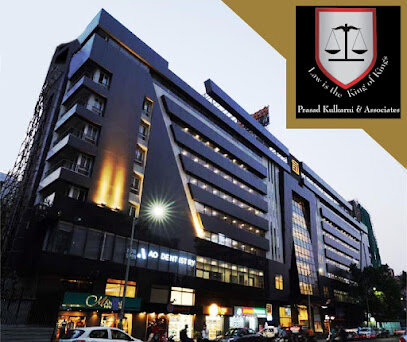Best Environmental Law & Compliance Lawyers in Pune
Share your needs with us, get contacted by law firms.
Free. Takes 2 min.
List of the best lawyers in Pune, India
About Environment Law in Pune, India
Environment law in Pune, like the rest of India, is governed by a comprehensive set of legal frameworks aimed at protecting the environment and ensuring sustainable development. Pune, being a rapidly developing city, faces several environmental challenges such as pollution control, waste management, and protection of green spaces. Environmental laws in India include a mix of Acts, Rules, and Regulations enforced by both central and state authorities, complemented by local municipal regulations specific to Pune.
Why You May Need a Lawyer
There are several situations where you might require legal assistance in the field of environmental law in Pune:
- Pollution Control: Businesses and individuals may need legal support to comply with pollution control regulations, or to contest unfair penalties.
- Land Use and Zoning: Legal advice may be necessary when dealing with land use changes, zoning disputes, or development projects affecting the environment.
- Environmental Clearance: When starting new industrial or construction projects, obtaining necessary environmental clearance can be a complex legal process.
- Public Interest Litigation (PIL): Citizens might need legal help to file PILs to protect the environment from hazardous activities or to prevent environmental degradation.
- Waste Management: Legal assistance may be required for compliance with waste management laws, especially for businesses dealing with hazardous wastes.
Local Laws Overview
Several local laws and regulations apply specifically to Pune, augmenting the broader national environmental legal framework:
- Maharashtra Pollution Control Board (MPCB): Oversees enforcement of state-level pollution control statutes.
- Maharashtra Regional and Town Planning Act: Governs land use and development planning in Pune, ensuring environmental considerations are met.
- Pune Municipal Corporation (PMC) Regulations: Various municipal regulations and bylaws address waste management, green cover protection, and water conservation.
- Pune Environment Status Report: An annual report by PMC that includes data and regulatory changes pertaining to environmental status in Pune.
Frequently Asked Questions
What are the major environmental issues faced by Pune?
The major issues include air pollution, water pollution, waste management, deforestation, and the need for sustainable urban planning.
What is the role of the Maharashtra Pollution Control Board in Pune?
The MPCB monitors and regulates pollution levels in Pune by setting standards, issuing permits, and conducting inspections to ensure compliance.
How can citizens participate in environmental decision-making in Pune?
Citizens can participate through public hearings, submitting suggestions during policy drafting, and filing Public Interest Litigations (PILs) in court.
What is Public Interest Litigation (PIL) in environmental law?
PIL allows citizens to file lawsuits in court for the protection of public interest, especially regarding environmental issues affecting the community at large.
How can businesses ensure compliance with environmental regulations in Pune?
Businesses should stay updated with local laws, obtain necessary licenses and permits, conduct regular environmental audits, and seek legal guidance for compliance.
What are the penalties for non-compliance with environmental laws in Pune?
Penalties may include fines, revocation of licenses or permits, and in severe cases, imprisonment for responsible individuals.
Is environmental clearance mandatory for all construction projects in Pune?
Not all; only certain projects, typically those above a specific size or likely to have significant environmental impact, require environmental clearance.
Where can I report an environmental violation in Pune?
Violations can be reported to the Maharashtra Pollution Control Board (MPCB) or Pune Municipal Corporation (PMC), depending on the nature of the violation.
What rights do residents have if a construction project harms their environment?
Residents can file complaints with local authorities, seek legal counsel, or file a PIL to halt activities and seek remediation for environmental harm.
How can organizations contribute to better environmental practices in Pune?
Organizations can implement sustainable practices, comply with regulations, participate in environmental awareness programs, and support eco-friendly initiatives.
Additional Resources
Here are some useful resources for those seeking legal advice or information about environmental issues in Pune:
- Maharashtra Pollution Control Board (MPCB): Provides standards, permits, and reports on pollution control.
- Pune Municipal Corporation (PMC): Offers information on local environmental regulations, waste management, and public participation opportunities.
- National Green Tribunal (NGT): For filing complaints and PILs related to environmental issues.
- Environmental NGOs: Organizations like TERI (The Energy and Resources Institute) and CSE (Centre for Science and Environment) offer valuable insights and assistance.
Next Steps
If you need legal assistance with environmental issues in Pune, consider the following steps:
- Identify Your Issue: Clearly outline the specific environmental issue or legal requirement you are facing.
- Consult an Environmental Lawyer: Engage with a lawyer who specializes in environmental law to understand your rights and obligations.
- Gather Documentation: Collect all relevant documents, permits, and correspondence related to the issue for your lawyer's review.
- File Complaints or Legal Actions: Based on legal advice, file necessary complaints with local authorities or take the issue to court if required.
- Stay Compliant: Ensure ongoing compliance with environmental laws and participate in community efforts to safeguard Pune's environment.
By taking these steps, you can address environmental legal issues effectively and contribute to the sustainable development of Pune.
Lawzana helps you find the best lawyers and law firms in Pune through a curated and pre-screened list of qualified legal professionals. Our platform offers rankings and detailed profiles of attorneys and law firms, allowing you to compare based on practice areas, including Environmental Law & Compliance, experience, and client feedback.
Each profile includes a description of the firm's areas of practice, client reviews, team members and partners, year of establishment, spoken languages, office locations, contact information, social media presence, and any published articles or resources. Most firms on our platform speak English and are experienced in both local and international legal matters.
Get a quote from top-rated law firms in Pune, India — quickly, securely, and without unnecessary hassle.
Disclaimer:
The information provided on this page is for general informational purposes only and does not constitute legal advice. While we strive to ensure the accuracy and relevance of the content, legal information may change over time, and interpretations of the law can vary. You should always consult with a qualified legal professional for advice specific to your situation.
We disclaim all liability for actions taken or not taken based on the content of this page. If you believe any information is incorrect or outdated, please contact us, and we will review and update it where appropriate.











